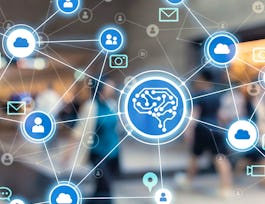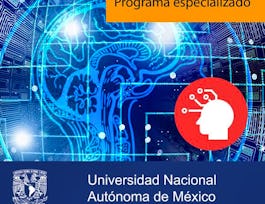Will ArtificiaI Intelligence soon be surpassing humans? This is rapidly becoming one of the central questions of our time -- but it is the wrong question. In this course, we will provide a non-technical look at where AI has come from, and where it is going. We will see that there is no reason to expect that AI will be surpassing humans. Instead, what we are learning to create with AI is the illusion of intelligence.



AI and the Illusion of Intelligence

Instructor: Daniel Hardt
Sponsored by IEM UEM Group
3,217 already enrolled
(19 reviews)
Details to know

Add to your LinkedIn profile
7 assignments
See how employees at top companies are mastering in-demand skills


Earn a career certificate
Add this credential to your LinkedIn profile, resume, or CV
Share it on social media and in your performance review

There are 4 modules in this course
Can AI match or surpass human intelligence? This is rapidly becoming the central question of our time -- but as we will see, it's the wrong question. In this module we will see that we can gain insight from centuries-old ideas about machines and intelligence.
What's included
4 videos1 reading1 assignment2 discussion prompts
As Turing foresaw over a half-century ago, there has been a stunning development in computer technology, to the point where computers can mimic aspects of human intelligence. But something much bigger has happened -- we have begun for the first time in history to profoundly understand the nature of human intelligence, especially concerning language, in what has become known as the cognitive revolution. When we think about AI, we tend to think about the machines -- but in fact, it has always been all about us.
What's included
4 videos2 readings2 assignments2 discussion prompts
There has been impressive progress in AI development, especially concerning language technology. But the whole point of using language is to communicate meaning -- is AI progressing towards the goal of understanding meaning? Does it even make sense to think that a computer could understand us?
What's included
5 videos4 readings2 assignments2 discussion prompts
With the Turing Test, Alan Turing suggested that computers might conceivably match or even surpass humans -- this is something more and more people are worried about. But Turing also showed, with the Halting Problem, that many problems go beyond what can ever be computed. There's no reason to assume that human intelligence could ever be captured by computation. More importantly, human intelligence and abilities are not static -- and AI is best thought of as a way of amplifying human abilities.
What's included
6 videos2 assignments1 discussion prompt
Instructor

Offered by
Why people choose Coursera for their career




Learner reviews
19 reviews
- 5 stars
68.42%
- 4 stars
21.05%
- 3 stars
10.52%
- 2 stars
0%
- 1 star
0%
Showing 3 of 19
Reviewed on Oct 14, 2024
It is really another masterpiece and really loved the content. loved it the way presented.
Reviewed on Sep 15, 2023
Excellent platform for learning and engaging in critical thought, specifically, regarding the philosophical ideas as well as computational theories that constitute the rapid development of modern AI.
Recommended if you're interested in Computer Science

University of Washington

Universidad Nacional Autónoma de México

Open new doors with Coursera Plus
Unlimited access to 10,000+ world-class courses, hands-on projects, and job-ready certificate programs - all included in your subscription
Advance your career with an online degree
Earn a degree from world-class universities - 100% online
Join over 3,400 global companies that choose Coursera for Business
Upskill your employees to excel in the digital economy




